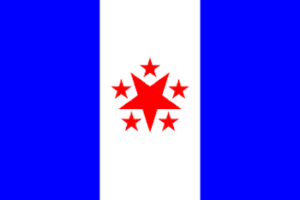
Bahian Revolution Flag, 1798
*On this date, in 1798, the Bahian Conspiracy was declared. Also known as the Revolt of the Tailors (after the occupation of many of the leaders), it was a late eighteenth-century African slave rebellion in Bahia, in the State of Brazil.
This separatist movement had a popular base and extensive participation from Afro Brazilians. The objective of the rebelling baianos was proposing to liberate the slaves as one of the main goals. Its leaders and members included freed Blacks, Black slaves, Pardo slaves, freed Pardos, artisans, and tailors from the most oppressed or discriminated classes of Bahia colonial society. With many slaves living in Bahia, the probability of revolts and rebellion was high. The area's elites were frightened that if rebellion or revolts did happen, the results would be similar to the Haitian Revolution. Because of the significant participation of Bahia's lower classes, the Bahian revolt was also called “The First Brazilian Social Revolution.”
The revolt began in Salvador when a group of disenfranchised workers sought to initiate an uprising against Portuguese authority. These marginalized groups resented the Portuguese “for their domination of the country and the wealth that a handful of free Brazilians had accumulated." This revolt was influenced by the principles of education and the successful independence movements that resulted. To add to the narrative of civil discontent were the various accusations of corruption and wrongdoing made toward Salvador's High Court, which Portuguese authorities failed to investigate properly, and the internal and external conflict that a conspiracy of rebellion developed.
A conversation in 1797 between Francisco Moniz Barreto, Lucas Dantas d'Amorim Tôrres, and Manuel de Santa Anna resulted in a forty-four-line poem authored by Barreto. August 12, 1798, a proclamation (poem) was posted at a church door in Salvador, Bahia, and read: “Be encouraged, People of Bahia, because the time of our Liberty is approaching. The time when all will be brothers. The time when all will be equal.” This written proclamation with no identified author brought the conspiracy to the attention of Bahia's authorities. It took less than two weeks for authorities to apprehend and charge forty people tied to the revolt. Out of these forty, thirty-six were brought to trial. Of these were one university graduate, one of noble heritage, two junior officers in the army, eight military men, and the remainder self-employed artisans, including ten tailors.
Twenty-four of the forty seized were of Mulatto heritage, and “almost all were native-born Brazilians.” Those tried were charged with conspiring against the Crown, pillaging, and planning to murder government officials. Seventeen of the accused were absolved, four were given prison sentences, eight were exiled to Africa, two slaves involved were sold and discharged from the military, and five were sentenced to death. On November 8, 1799, four conspiracy leaders were publicly hanged. The strategy and resulting repression demonstrated the different goals that previously silent social groups were bringing to the foreground and the importance of class position in determining the depth of commitment of individual insurgents.